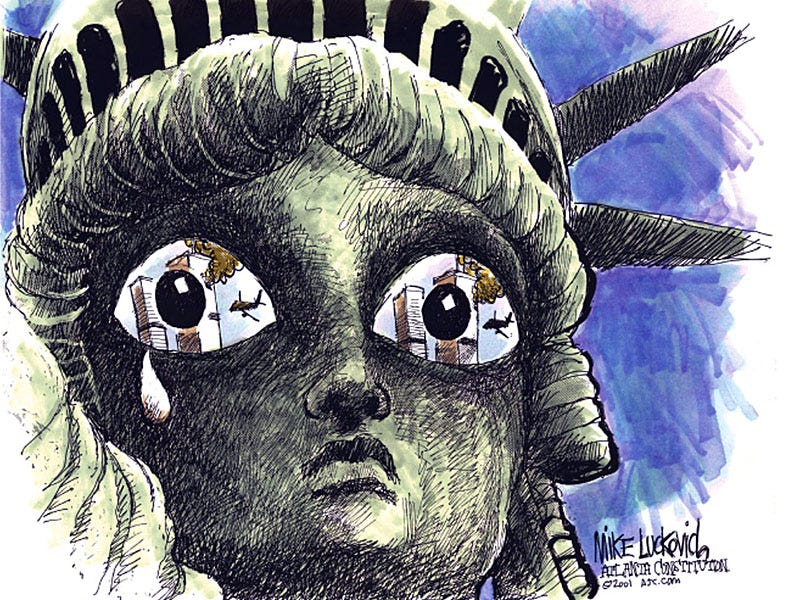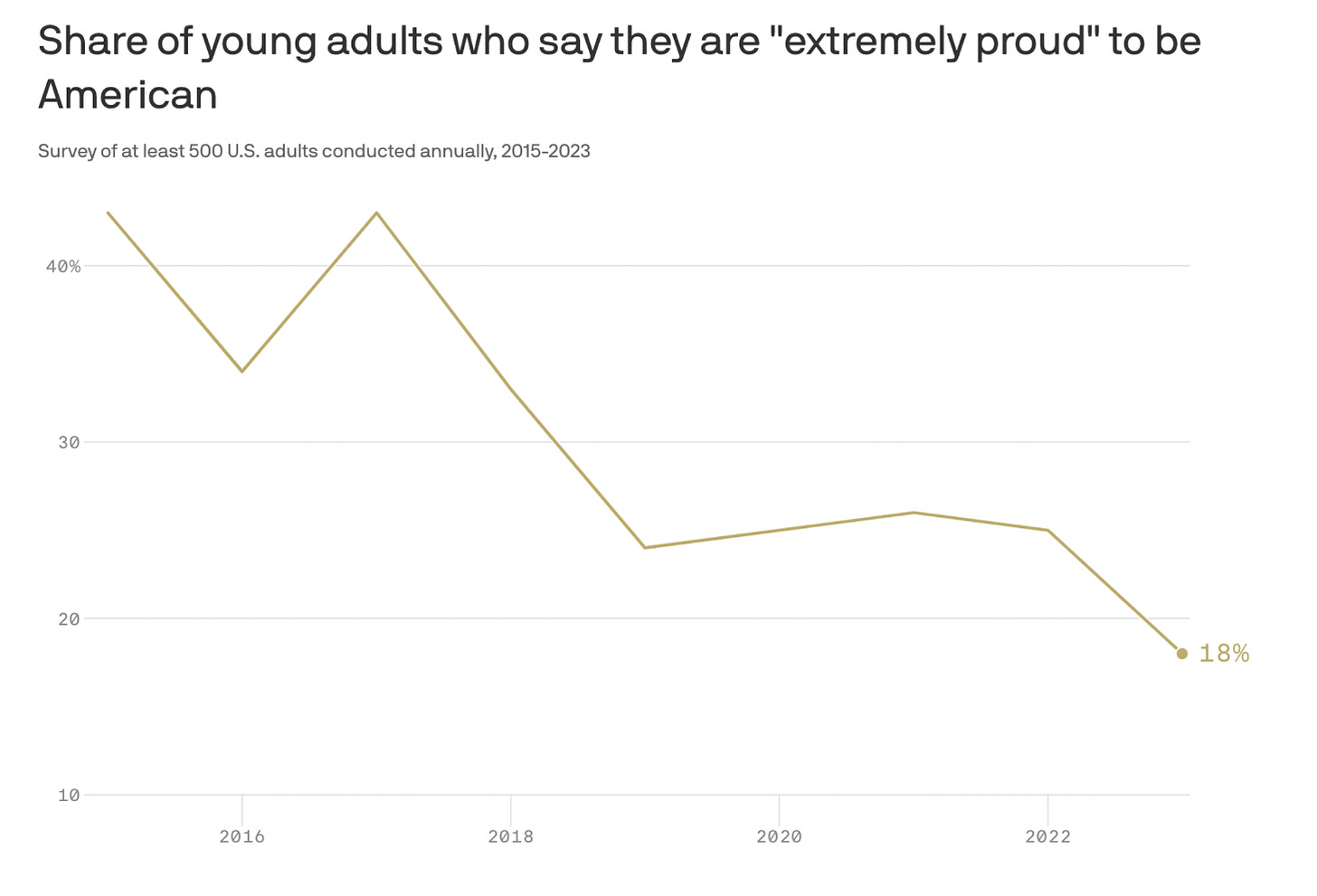The Profile: The shark attack survivor at the Paralympics & the VC who raised $50M by winning the internet
This edition of The Profile features Nichole Wischoff, Ali Truwit, and others.
Good morning, friends.
Like many of you, I remember exactly where I was on Sept. 11, 2001.
I was in Atlanta sitting in my fifth grade classroom when our teacher, who had family in New York, wheeled in the TV.
She turned on CNN in an attempt to figure out what was happening, and that’s when our entire class watched live as the second plane hit the South Tower of the World Trade Center.
All the kids sat in disbelief. Our teacher started crying. At this point, I had only been in the U.S. for one year so I was trying to figure out what all this meant, but I knew it wasn’t good.
I’ll never forget the following weeks. There were moments of silence for those who lost their lives in the attacks. There was that iconic cartoon of a weeping Statue of Liberty. And there were lots and lots of American flags.
Patriotic sentiment surged in the months following. A whopping 79% of adults said they displayed an American flag in October 2001, and 65% to 70% of Americans expressed extreme pride in being American between 2002 and 2004.
Now, 23 years after the attacks, patriotism is on the decline, and most young people aren’t proud of their national identity.
Only 18% of Americans aged 18-34 are "extremely proud" to be American.
I mean, look at this chart:
As you can imagine, that pivotal event — watching the attacks in New York City on CNN — left a mark on my heart. As fate would have it, I majored in journalism, worked at CNN, and now live in New York City.
I have previously written about how much I love New York, so I will spare you, but today, I wanted to say something that may sound controversial but shouldn’t: I wholeheartedly love America.
I am part of that 18% of Americans aged 18 to 34 who are “extremely proud” to be American. My reasoning is simple: It’s because this country has allowed my family upward mobility that would be inconceivable anywhere else on this planet.
And I’m not talking about generations — I’m talking about the difference in life of one generation.
When my dad was in 6th grade, he wrote ‘USA’ on his backpack. The teacher saw it, reported it to the principal, and they called his parents. He got in major trouble because he lived in Bulgaria, a former communist country that doled out punishments for those who dared deviate from the government’s ‘allowed’ speech. (Not to mention that my dad’s family members who had spoken out against communism were killed, imprisoned, and sent to labor camps.)
His daughter (me) would go on to become a journalist working for some of the most prestigious news organizations in the world: CNN, USA TODAY, and FORTUNE magazine. Inconceivable.
I’ve seen the absurd articles about how the constitution is now reportedly “dangerous” and how identifying as a “socialist” gains you status in some parts of our society. I have no interest in being dragged into the political wars that rage on today because I don’t subscribe to any one political party, but I’m sure someone will misconstrue my words to mean something they don’t.
The truth is this: I was born in Bulgaria, and it was my home for the first 8 years of my life. The United States has been my home for the last 25. As a naturalized citizen of this country, I do not take my life here for granted.
This country is far from perfect, but it’s a nation of self-improvers. When something is wrong, people take to the streets, protest, and make sure their voices get heard.
Mark Twain once said:
“I would teach patriotism in the schools, and teach it this way: I would throw out the old maxim, ‘My country, right or wrong,’ etc., and instead I would say, ‘My country when she is right.’ Because patriotism is supporting your country all the time, but your government only when it deserves it.
“So I would not take my patriotism from my neighbor or from Congress. I should teach the children in the schools that there are certain ideals, and one of them is that all men are created free and equal. Another that the proper government is that which exists by the consent of the governed.”
So on this Sept. 11 and beyond, it’s important to remember the difference between patriotism and nationalism. Patriotism is the love and devotion to your country and its values, often expressed through pride in its achievements and a desire to improve it. Nationalism, on the other hand, is the belief that your country is superior to others without seeing a need for improvement.
As retired U.S. General Mark A. Milley said, “Those terrorists hated America. They hated our Constitution and the values that bind us together as a nation. Those terrorists wanted to destroy our country. But, on that day and every day since, the United States has demonstrated that we would never bow to fear and hatred.”
PROFILES.
— The shark attack survivor at the Paralympics [**HIGHLY RECOMMEND**]
— The VC who proved herself by winning the internet
— America's greatest jam band
— The breast pump startups making nursing moms ‘more productive’
— The software company fueling local governments
PEOPLE TO KNOW.
The shark attack survivor at the Paralympics: Ali Truwit recently won a silver medal at the Paralymics. Just a year ago, this Yale grad fought off a shark and swam for her life following an unprovoked attack in which she lost her left foot and part of her leg. This profile took my breath away. A must-read. (ESPN)
"To see your leg you've seen for 23 years, and it just ends right there ... that was hard,”
The VC who proved herself by winning the internet: You may have seen Nichole Wischoff on the internet. A consistent poster on X and TikTok, she’s gone unexpectedly viral in recent years — including when she posted about closing an investment with a founder while on her honeymoon. Last year, when Midas List investor Keith Rabois dismissed her critique of the Miami startup ecosystem as that of a “third tier VC,” the immediate blowback turned the would-be insult into an internet meme. But she’s having the last laugh as all that internet fame has helped her raise a $50 million venture fund. (Forbes; if you can’t access the article, try this link)
“Founders love the relatability of the scrappiness and the hustle… if people don’t know who you are, then you are f**ked.”
America's greatest jam band: The members of the rock band Phish have weathered derision, addiction, and even a temporary breakup, but they legends just keep swimming. In this profile, GQ embedded with the band (and tens of thousands of fans) in a field in Delaware to watch them stage their first festival in nine years—and reinvent themselves one more time. (GQ)
“A lot of bands in the ’90s wanted to ‘get big’ or something. We had a lot of awkward conversations about what our intent was back then.”
COMPANIES TO WATCH.
The breast pump startups making nursing moms ‘more productive:’ Breastfeeding is one of the biggest challenges for a new mother returning to work in the US. It usually requires bringing a breast pump to work, making time in a busy schedule to express milk every few hours, and then cleaning and putting it away after each session. Enter MilkMate. The company says it has developed a way to help shave 15 minutes off each pumping session. For working moms who need to pump about three times daily while at work, that can mean saving as many as 23 working days a year. (Bloomberg; if you can’t access the article, try this link)
“This does make it easier for people to come to the office and be more productive in the office.”
The software company fueling local governments: You’ve probable never heard of Tyler Technologies, but it’s a heavyweight of local government software. It provides endless applications for the public sector, including for construction permitting, police dispatching, jail booking, property appraising, campground reserving, restaurant inspecting, cannabis licensing and school bus tracking. Customers range from the US’s second-largest state parks system (California’s) to its third-largest prison network (Florida’s). In 2019, Tyler won an $85 million, 10-year contract with North Carolina to install its Odyssey software statewide and subsequently inked deals for related services worth $38.5 million. But adapting the software to the state’s unique regulatory needs proved challenging. (Bloomberg; if you can’t access the article, try this link)
“This lady from Tyler told us, ‘Do you want to continue doing it the way you’ve been doing it, or do you want to do it the right way?’ I said, ‘Excuse me?!’ And I kicked her out of my office.”
✨ The rest of this newsletter is only available for premium members of The Profile, whose support makes this work possible. If you’re not already a premium member, consider upgrading your subscription below for access to an additional section of weekly audio + video recommendations. ✨




